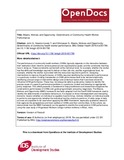| dc.contributor.author | John, Aparna | |
| dc.contributor.author | Newton-Lewis, Thomas | |
| dc.contributor.author | Srinivasan, Shuchi | |
| dc.date.accessioned | 2019-11-01T13:46:31Z | |
| dc.date.available | 2019-11-01T13:46:31Z | |
| dc.date.issued | 2019-10-23 | |
| dc.identifier.citation | John A,;Newton-Lewis T, and Srinivasan S. Means, Motives and Opportunity: determinants of community health worker performance. BMJ Global Health 2019;4:e001790. doi:10.1136/ bmjgh-2019-001790 | en |
| dc.identifier.uri | http://opendocs.ids.ac.uk/opendocs/handle/20.500.12413/14763 | |
| dc.description.abstract | The performance of community health workers (CHWs) typically depends on the interaction between their motivation (their intent to achieve personal and organisational goals) and the constraints that they face in doing so. These constraints can be both at the individual level, for example, whether the worker has the skills and knowledge required to deliver on their job role, and the organisational level, for example, whether the worker is provided with the resources required to perform. Designing interventions to improve the performance of CHWs requires identifying the constraints to performance in a particular context. Existing frameworks on CHW performance tend to be derived empirically, identifying a broad range of intervention design and contextual factors that have been shown to influence CHW performance. These may not always be able to guide policy makers to identify the precise cause of a specific performance problem in a particular context and develop an appropriate policy response. This article presents a framework to help practitioners and researchers diagnose the constraints to performance of CHWs and guide programmatic and policy responses. The Means, Motives and Opportunity (MMO) framework has been adapted from the SaniFOAM framework used to identify the determinants of sanitation behaviours. It is based on three interdependent and interacting domains: means (whether an individual is capable of performing), motives (whether an individual wants to perform) and opportunity (whether the individual has the chance to perform). A wide range of data sources are expected to be used when applying the MMO framework, especially qualitative research that captures the perspectives and lived realities of CHWs and their communities. In this article, we demonstrate how the MMO framework can be applied to identify the constraints to CHW performance using the case study of Anganwadi Workers (village nutrition workers) in Bihar, India. | en |
| dc.language.iso | en | en |
| dc.publisher | BMJ | en |
| dc.relation.ispartofseries | BMJ Global Health; | |
| dc.rights.uri | http://creativecommons.org/licenses/by/4.0/ | en |
| dc.subject | Health | en |
| dc.subject | Work and Labour | en |
| dc.title | Means, Motives and Opportunity: Determinants of Community Health Worker Performance | en |
| dc.type | Article | en |
| dc.rights.holder | © Author(s) (or their employer(s)) 2019. Re-use permitted under CC BY. Published by BMJ | en |
| dc.identifier.externaluri | https://gh.bmj.com/content/4/5/e001790 | en |
| dc.identifier.team | Health and Nutrition | en |
| dc.identifier.doi | 10.1136/ bmjgh-2019-001790 | |
| dcterms.dateAccepted | 2019-10-05 | |
| rioxxterms.funder | Default funder | en |
| rioxxterms.identifier.project | Default project | en |
| rioxxterms.version | NA | en |
| rioxxterms.versionofrecord | 10.1136/ bmjgh-2019-001790 | en |
| rioxxterms.funder.project | 9ce4e4dc-26e9-4d78-96e9-15e4dcac0642 | en |


